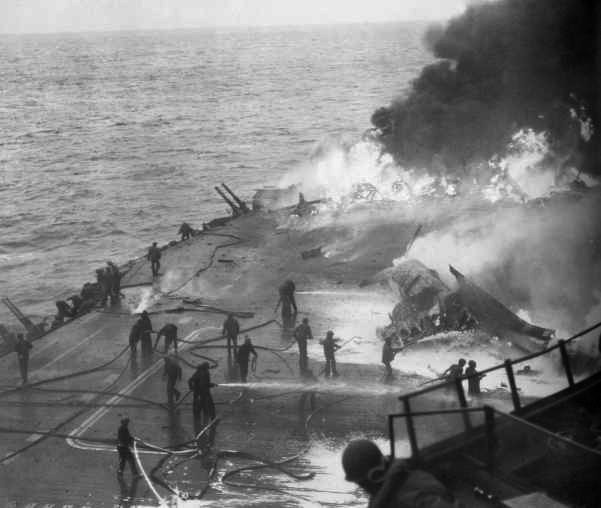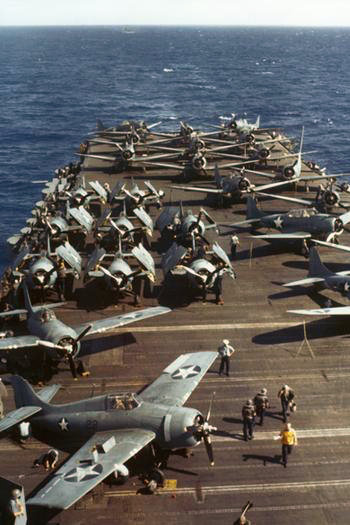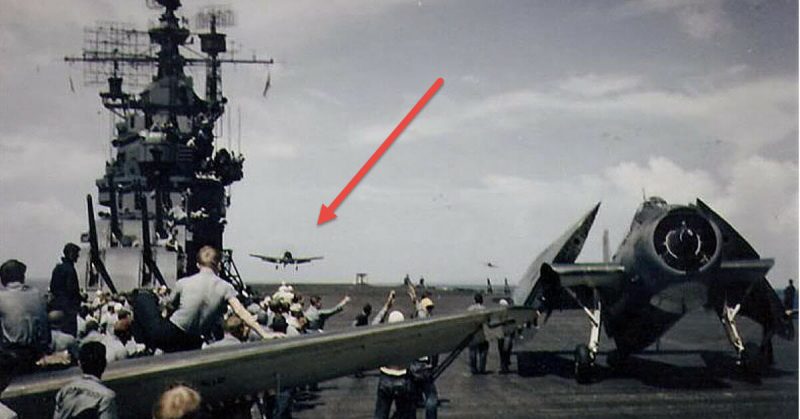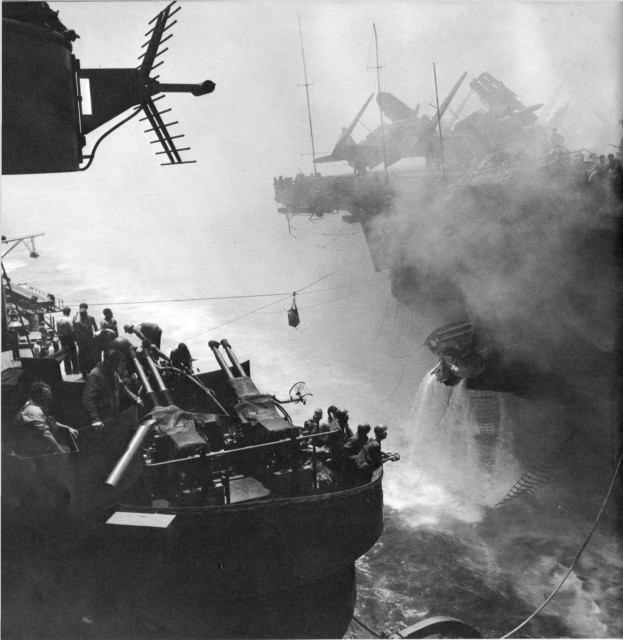The war in the Pacific was, for the first time, a war of Aircraft Carriers. They took over the leading role from the battleships which had been the queens of the sea for the previous centuries. For the first time, battles at sea were fought between fleets that were hundreds of miles from each other.
We have selected 22 images of the American side of the carrier war for you to enjoy, but also to show the sacrifice of those onboard the ships and planes that fought against the Japanese empire.
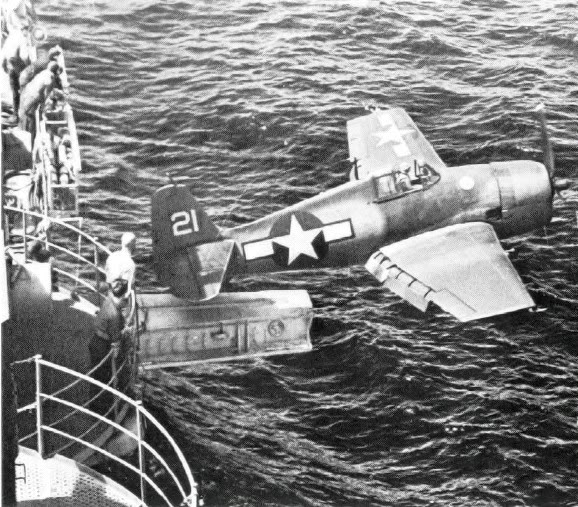 A U.S. Navy Grumman F6F-3 Hellcat fighter of fighting squadron VF-2 being catapulted from the aircraft carrier USS Hornet (CV-12) via the hangar catapult, 25 February 1944.
A U.S. Navy Grumman F6F-3 Hellcat fighter of fighting squadron VF-2 being catapulted from the aircraft carrier USS Hornet (CV-12) via the hangar catapult, 25 February 1944.
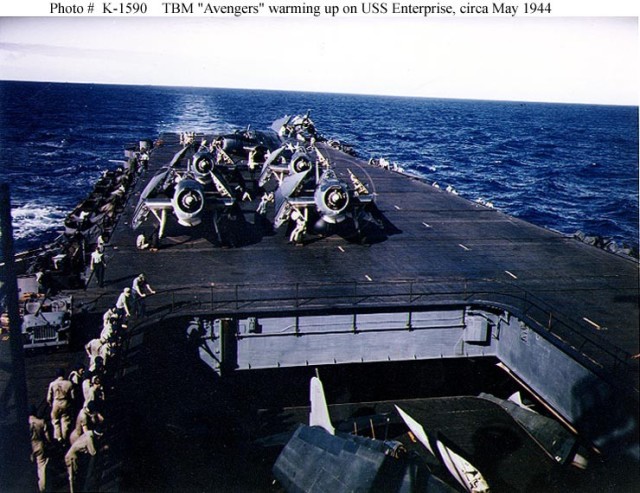
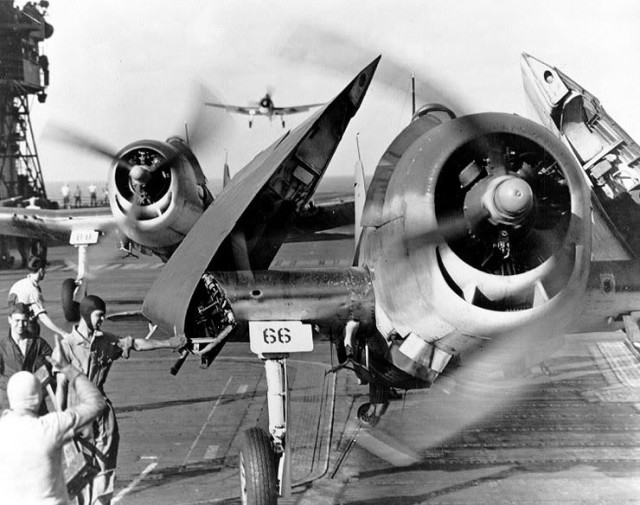 Grumman F6F-3 “Hellcat” fighters of fighter squadron VF-10 Grim Reapers, Carrier Air Group 10 (CVG-10), landing on the U.S. aircraft carrier USS Enterprise (CV-6) after strikes on the Japanese base at Truk, 17-18 February 1944. Flight deck crewmen are folding planes’ wings and guiding them forward to the parking area.
Grumman F6F-3 “Hellcat” fighters of fighter squadron VF-10 Grim Reapers, Carrier Air Group 10 (CVG-10), landing on the U.S. aircraft carrier USS Enterprise (CV-6) after strikes on the Japanese base at Truk, 17-18 February 1944. Flight deck crewmen are folding planes’ wings and guiding them forward to the parking area.
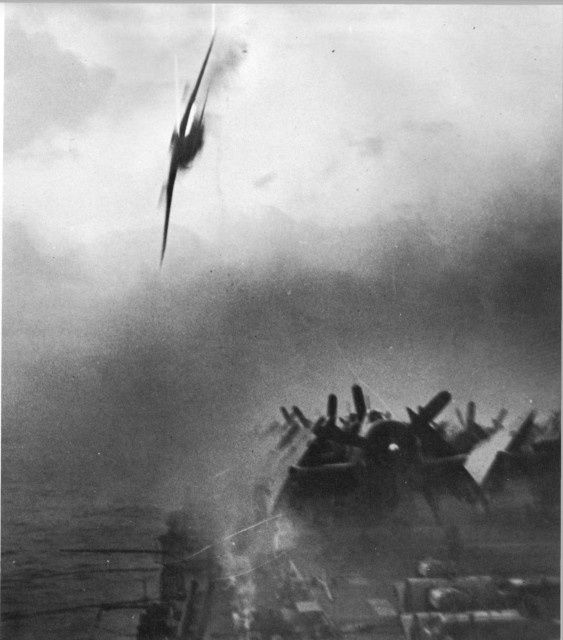 Japanese Kamikaze plunge that missed and crashed alongside the USS Sangamon (U. S. Navy Photo)
Japanese Kamikaze plunge that missed and crashed alongside the USS Sangamon (U. S. Navy Photo)
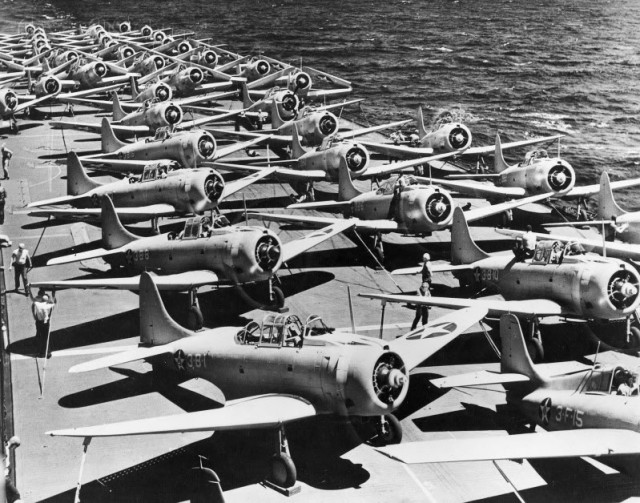 View of the commencement of a launch of the Saratoga Air Group on board the U.S. Navy aircraft carrier USS Saratoga (CV-3), 1941. The plane nearest to the camera is a Grumman F4F-3 Wildcat of fighting squadron VF-3 (3-F-15), followed by Douglas SBD-3 Dauntless of bombing squadron VB-3. Douglas TBD-1 Devastators are spotted on the aft part of the flight deck (wings folded), followed by SBD-3s, probably of scouting squadron VS-6. Note the overall light gray paint schemes with white lettering and numbering that was carried aboard naval aircraft for a short time during 1941.
View of the commencement of a launch of the Saratoga Air Group on board the U.S. Navy aircraft carrier USS Saratoga (CV-3), 1941. The plane nearest to the camera is a Grumman F4F-3 Wildcat of fighting squadron VF-3 (3-F-15), followed by Douglas SBD-3 Dauntless of bombing squadron VB-3. Douglas TBD-1 Devastators are spotted on the aft part of the flight deck (wings folded), followed by SBD-3s, probably of scouting squadron VS-6. Note the overall light gray paint schemes with white lettering and numbering that was carried aboard naval aircraft for a short time during 1941.
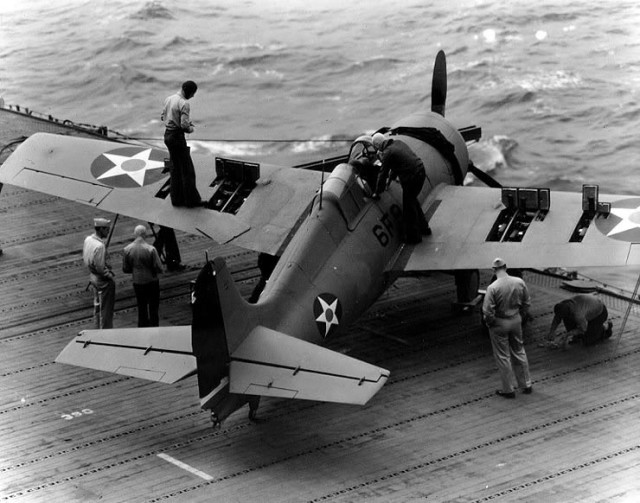 Grumman F4F-4 “Wildcat” fighter, of Fighting Squadron Six (VF-6) has its six .50 caliber machine guns tested on the flight deck of USS Enterprise (CV-6), 10 April 1942. Note open gun bays in the plane’s wings and markings below the cockpit (“6F9” with no dashes between letters and numerals)
Grumman F4F-4 “Wildcat” fighter, of Fighting Squadron Six (VF-6) has its six .50 caliber machine guns tested on the flight deck of USS Enterprise (CV-6), 10 April 1942. Note open gun bays in the plane’s wings and markings below the cockpit (“6F9” with no dashes between letters and numerals)
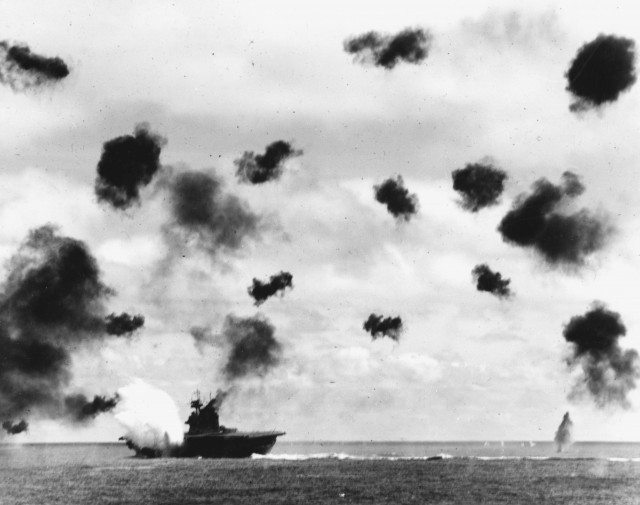
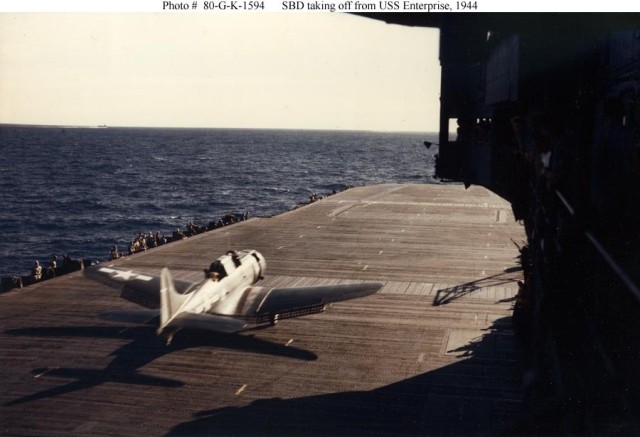
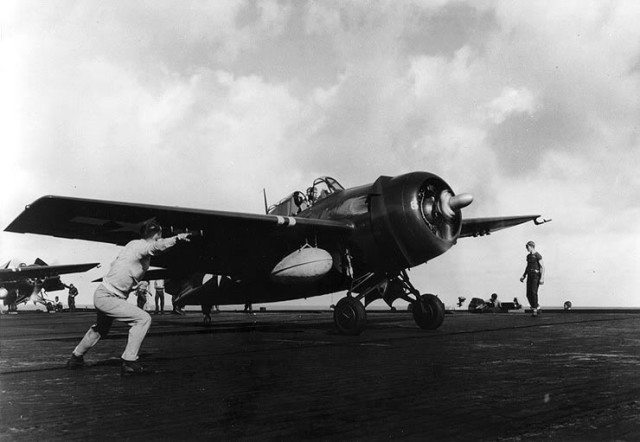 U.S. Navy Grumman FM-2 Wildcat fighter of composite squadron VC-84 launching from the escort carrier USS Makin Island (CVE-93) in the Pacific in 1945.
U.S. Navy Grumman FM-2 Wildcat fighter of composite squadron VC-84 launching from the escort carrier USS Makin Island (CVE-93) in the Pacific in 1945.
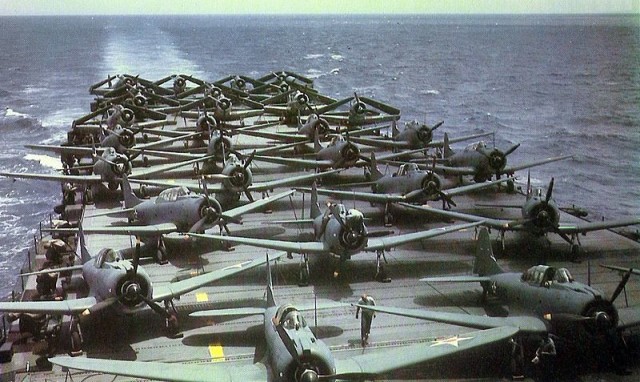
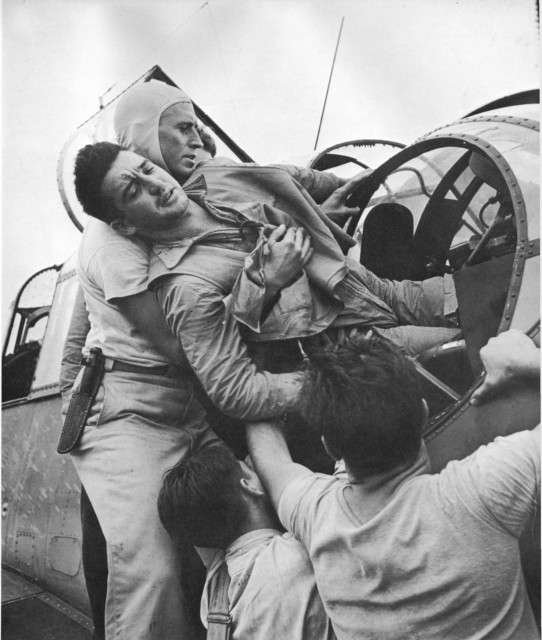 Aircrewman wounded in strike on Rabaul, on the Aircraft Carrier USS Saratoga, November 5 1943.
Aircrewman wounded in strike on Rabaul, on the Aircraft Carrier USS Saratoga, November 5 1943.
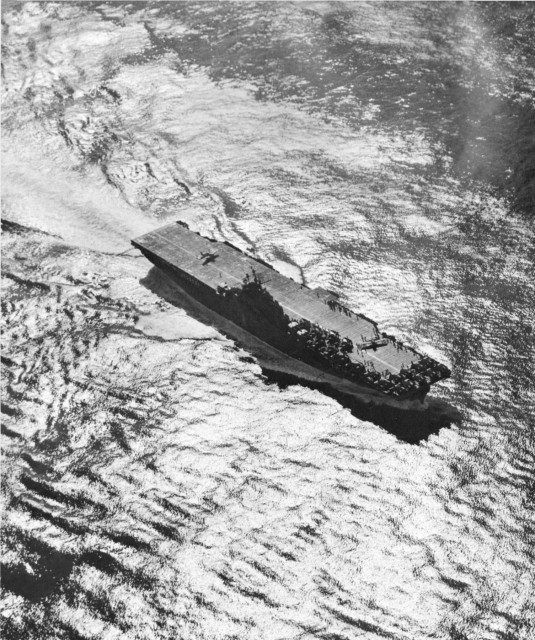 An aerial view shows the USS Yorktown landing her planes. Most of the footage for the motion picture The Fighting Lady was shot on the USS Yorktown. Photographed by Lt. Comdr. Charles Kerlee, USNR. U. S. Navy Photo
An aerial view shows the USS Yorktown landing her planes. Most of the footage for the motion picture The Fighting Lady was shot on the USS Yorktown. Photographed by Lt. Comdr. Charles Kerlee, USNR. U. S. Navy Photo
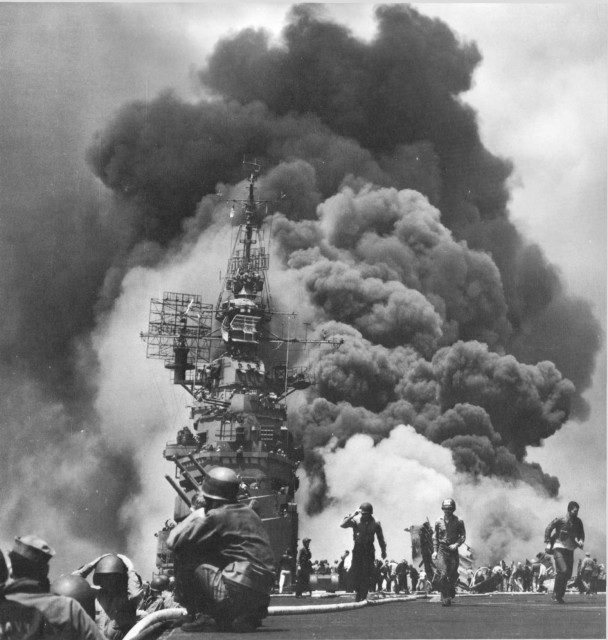 The USS Bunker Hill takes two kamikazes in 30 seconds on May 11, 1945.
The USS Bunker Hill takes two kamikazes in 30 seconds on May 11, 1945.
While operating with a fast carrier task force in the “slot” between Okinawa and Kyushu, these two suicide hits, acting as fuses to the gasoline-filled and bomb-laden planes, set the stage for one of the most heroic battles of the Pacific. Fighting suffocating flame and exploding rockets and bombs, the gallant crew, her heroes unnumbered, sacrificed 392 dead or missing and 264 wounded to save their ship. Photographed by a USS Bunker Hill photographer. U.S. Navy Photo
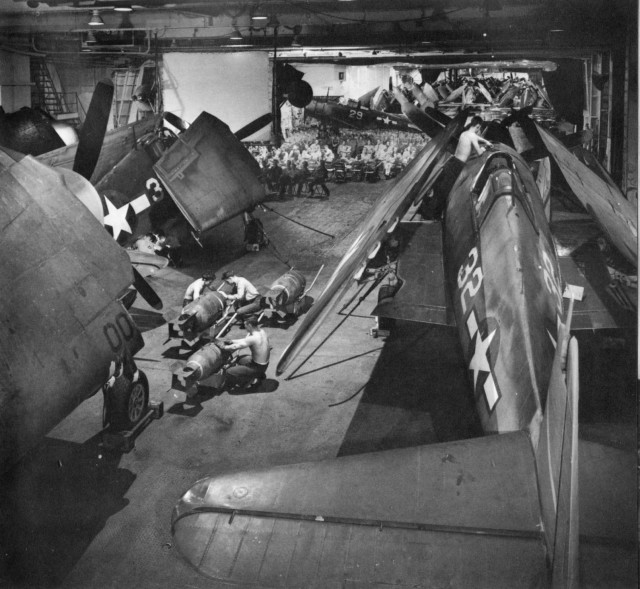 Ordnance men arming planes on the hangar deck of the USS Yorktown, while in the background men off duty are watching a movie. Photographed by Lt. Comdr. Charles Kerlee, USNR. U. S. Navy Photo
Ordnance men arming planes on the hangar deck of the USS Yorktown, while in the background men off duty are watching a movie. Photographed by Lt. Comdr. Charles Kerlee, USNR. U. S. Navy Photo
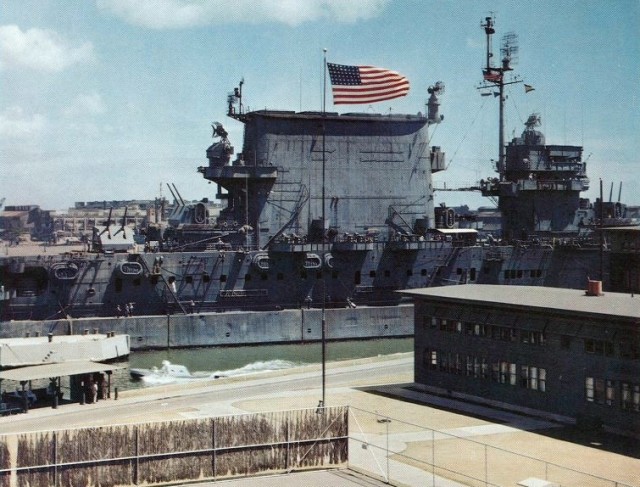
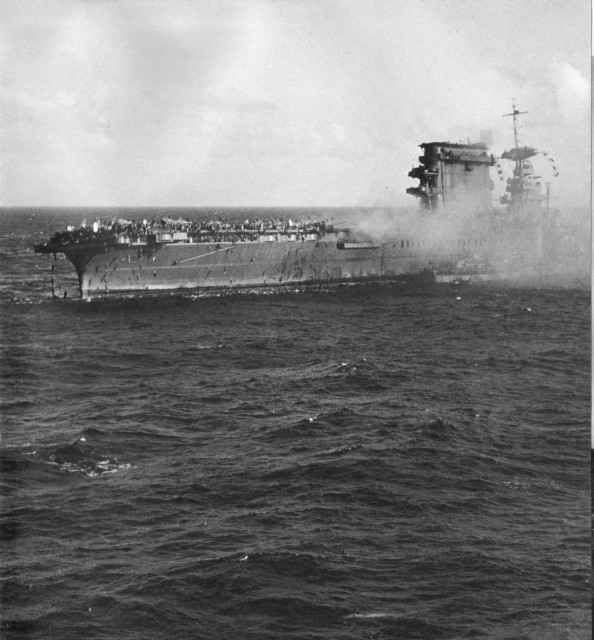 The old USS Lexington orders “abandon ship” – Coral Sea, May 1942. The destroyer alongside is taking off the sick and wounded while the able-bodied are sliding down ropes and being picked up by small boats. Not a man was lost in abandoning the ship. U. S. Navy Photo
The old USS Lexington orders “abandon ship” – Coral Sea, May 1942. The destroyer alongside is taking off the sick and wounded while the able-bodied are sliding down ropes and being picked up by small boats. Not a man was lost in abandoning the ship. U. S. Navy Photo
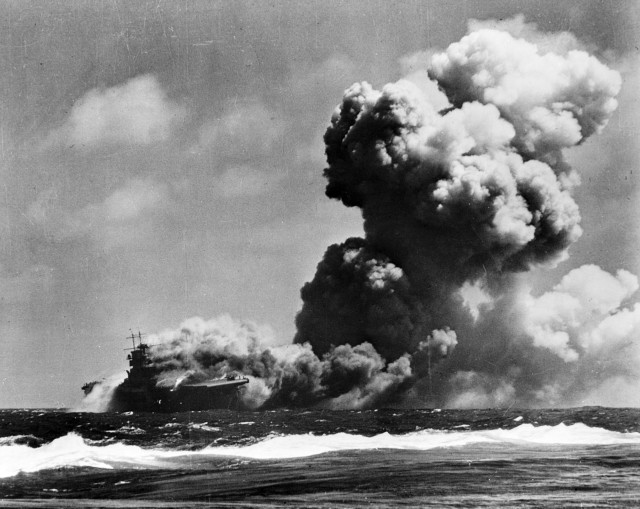
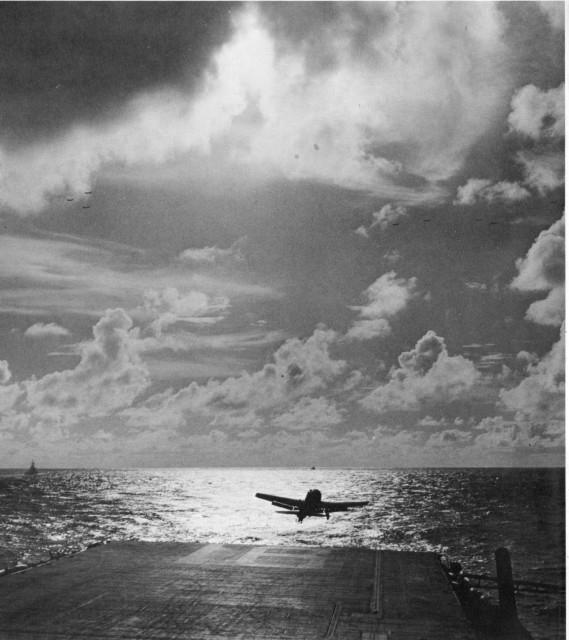 Takeoff from carrier USS Lexington for defense of Tarawa. Photographed by Capt. Edward Steichen, USNR. U. S. Navy Photo
Takeoff from carrier USS Lexington for defense of Tarawa. Photographed by Capt. Edward Steichen, USNR. U. S. Navy Photo
Transfer of wounded from the USS Bunker Hill to the USS Wilkes Barre, sick bays aboard carriers and battleships were actually medium-sized hospitals. U. S. Navy Photo
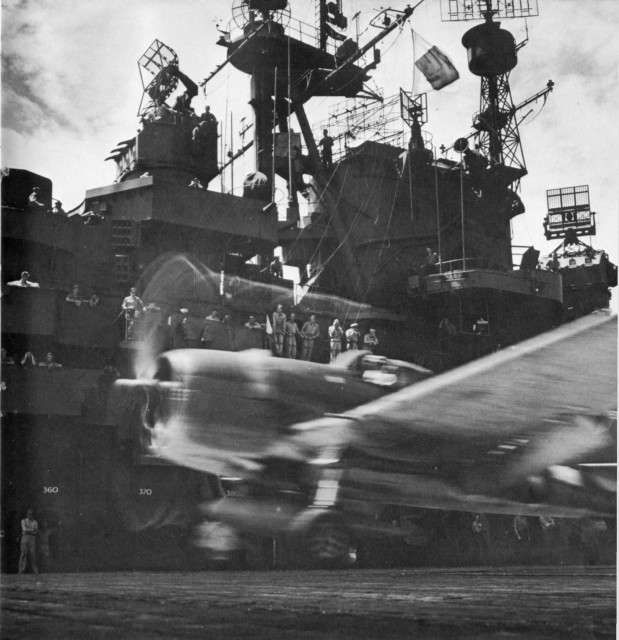 Hellcat roars off the flight deck of “the blue ghost” – The USS Lexington
Hellcat roars off the flight deck of “the blue ghost” – The USS Lexington
This photo taken aboard the USS Lexington was one of Capt. Steichen’s own. He had a special feeling for takeoff shots, contrasting action with a still background. Photographed by Capt. Edward Steichen. U. S. Navy Photo
